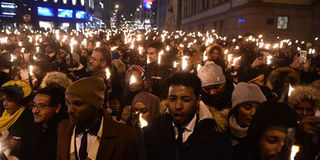Peace: Ethiopia’s Nobel Prize challenge

Ethiopians march during a torch parade in honour of the 2019 Nobel Peace Prize laureate, Ethiopia's Prime Minister Abiy Ahmed, in Oslo on December 10, 2019. PHOTO | REDRIK VARFJELL | AFP
What you need to know:
- Ethiopian political leaders must urgently negotiate an agreement on the basic rules of the game for the post-election order.
- Voting is critical to a democracy, but it is no panacea. Sometimes, what is needed is consensus-building.
Even as Ethiopian Prime Minister Abiy Ahmed wins this year’s Nobel Peace Prize, his country is at a crossroads.
In one direction lies a democratic transition via a successful general election scheduled for May 2020. The other path would lead to instability, ethnic violence and, possibly, a return to repressive authoritarianism.
For the past decade, Ethiopia has experienced strong, broad-based economic growth.
The government has invested in infrastructure development and expanded social services such as healthcare and education.
Since April 2 last year, when Ahmed peacefully took power following the shock resignation of his predecessor, Addis Ababa has been restoring political and economic freedoms.
Ahmed lifted the country’s state of emergency, ordered the release of thousands of political prisoners, allowed exiled dissidents to return, removed bans on political parties and unblocked censored media.
ETHNIC VIOLENCE
He reached an agreement with Eritrea to end a 20-year military stalemate following their 1998-2000 border war — the reason for his Nobel Prize.
Yet, as these reforms have taken hold, Ethiopia has faced an uptick in ethnic violence.
Recently, 86 people were killed in protests after a prominent activist alleged on social media that the government attempted to withdraw his security detail.
This unrest is the result of an economic and political chain reaction, much like those seen in Chile, Hong Kong and Lebanon, and, to some extent, even in places like the United States and the United Kingdom.
A big part of the population feels economically excluded and politically invisible, so they attempt to assert their status by throwing their support behind nationalist or sectarian causes.
DISENFRANCHISED GROUP
In Ethiopia, economic growth occurred against a backdrop of intense social and political repression.
Civil society was hollowed out and unscrupulous interest groups hijacked the State’s development agenda. Young people often lacked the skills or connections to secure decent employment.
But young people were educated enough to recognise the imbalances and mobilise on social media.
And with their newfound freedoms — restored faster than effective institutions could be built — they could turn organisation into action.
With state power eroded and the ruling coalition fragmented, the government was unprepared for the groundswell of discontent, fuelled by unresolved issues with deep historic and emotional roots.
In recent years, polarisation has severely strained the mature institutions of Western democracies.
QUALITY GOVERNANCE
Imagine the damage it can wreak in a country that lacks autonomous law enforcement or a functioning civil society. Ethiopia is yet to complete a transition from the rule of party to the rule of law.
Social mobilisation is a feature of a healthy democracy. But after decades under authoritarianism, Ethiopians are not protesting for a particular cause or economic policy change.
Securing political power is the only way to protect their social and economic interests, so each group is manoeuvring to restructure the political order to its advantage ahead of next year’s election — the first since the transition to democracy began. In anticipation of a winner-take-all poll, mistrust is rife.
Nationalism tends to weaponise nuanced policy arguments. Instead of speaking clearly on today’s economic issues, nationalist leaders often blend them into narratives about long-standing cultural and historical grievances, creating the illusion that their camp’s interests are aligned across all spheres.
ROLE OF POLLS
This ham-fisted approach can also be seen in attempts by some parties at making the upcoming election all about the contentious federal system, which is constituted along ethnic lines.
But an election is no way to decide fundamental questions of institutional structure.
Even in more developed democracies, from Hungary to Venezuela, the ballot box has proved capable of producing outcomes that leave societies more polarised and volatile.
But when the United Kingdom votes to leave the European Union, there is little doubt that its democracy will survive, even if the country takes a beating.
Ethiopian democracy could not survive a US President Donald Trump any more than it could a Venezuelan President Nicolás Maduro.
That is why Ethiopian political leaders must urgently negotiate an agreement on the basic rules of the game for the post-election order.
Voting is critical to a democracy, but it is no panacea. Sometimes, what is needed is consensus-building.
Only by recognising this can Ethiopia’s political elites avoid wasting this historic opportunity to consolidate democracy in their country.
Mr Bedasso is a researcher and public-finance specialist at the Collaborative Africa Budget Reform Initiative (Cabri). © Project Syndicate




